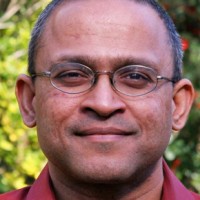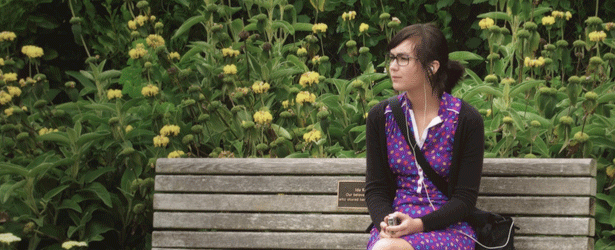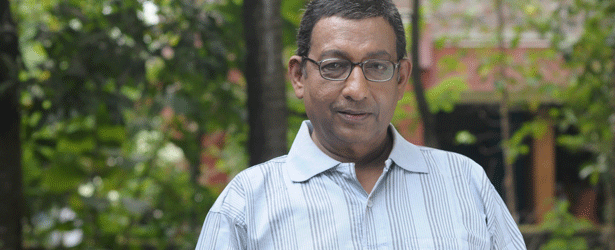CAAMsanity!
By Ravi Chandra, M.D.
March 7, 2012
Are you excited?! Are you ready?! Full court press! SFIAAFF is the champion point guard for the Asian American experience! I’ve already screened a few films – here is a sampling, by no means complete. In the paint this week – journeys, pilgrimages, and other genres.
Surrogate Valentine, last year’s closing night film, introduced me to the “mumblecore” or “bedhead” genre of films. (Thanks to G. Allen Johnson of the Chronicle for writing about those terms last year!) This year we have SV2, likely also in that genre (unless Goh reveals his true identity as a superhero, puts on a cape and starts jumping over buildings).
I previewed SALAD DAYS (Directors/Writers Hiram Chan, Jeff Mizushima and Emily Yoshida) and THE CRUMBLES (Director/Writer Akira Boch), which I really enjoyed, and which (I think) also fit in this genre. These are all low-key films about real life – there are no heroes or villains, just people, stumbling and mumbling through life. There is, in these films, a quality of “just being with” the experience of life. There isn’t a huge narrative arc, much dramatic tension, or an amazing monologue to speak of. Yet there is a display of life’s subtle but insistent demands: relationship, ambition, popularity…the undercurrent of ego which pulls the characters out to sea, where they drift, and look for rafts. To me, that’s a very touching kind of film, very true to a-certain-kind of 20-something life, and I congratulate the filmmakers on their wonderful work.
These films could also be seen as a display of an empty, shallow, and superficial “modernity”. If you’re looking to see reality with a different lens, I would recommend THE SUN BEATEN PATH and ABU, SON OF ADAM. In each film, faith and culture resonate in the lives of men, whose deep emotions are lived out in broad gesture. In the first film, a Tibetan man, Nyma, accidentally kills a relative. For Tibetans, whose religion and culture focus on compassion, who are known to move earthworms out of the paths of construction cranes, this is a profound and deeply scarring event which motivates a cross-country pilgrimage, a wandering that stretches a lost soul over the barren landscape of the Tibetan plateau. The kindness of a stranger, an older man, breaks Nyma’s isolation briefly, acting as a seed of relatedness in the setting of trauma to inner and outer relationships.
ABU, SON OF ADAM is about the preparation for a voyage, a pilgrimage to Mecca by a poor Indian Muslim man and his wife. We see life in a small Kerala village, where everyone knows everyone, and faith runs deep. Abu sets his sights on purity first, trying to mend his relationships and clear his conscience even as he sells many belongings in an attempt to gather enough money to make the trip. He is a man who makes many personal sacrifices to hone his virtue; I was left with both an abiding respect for his choices, the power of human bonds, and also a sense of how much Abu’s piety – perhaps moral rigidity – has cost him.
IN THE FAMILY also shows us the sun-beaten path of grief and loss, and the path of connection and relatedness which makes us whole, and keeps making us whole, time and time again. This is a must-see, amazing film by first-time director Patrick Wang, who also stars in the film as Joey, a father who loses his partner, Cody, leading to a custody battle over their son, Chip. What emerges in this nearly 3-hour long epic of the heart is a humble, certain humanity, and a love that assuredly erodes the walls which keep a family apart – and which redefines, in understated but poetic ways, the meaning of family itself. IN THE FAMILY reminded me of Ozu masterpieces, in its long takes, restrained pacing, focus on relationships and barely spoken but deeply felt emotion. Wang shows us the power of low-key, evocative filmmaking at its best.
Other journey films include RETURN TO BURMA, where the constant search for a job contrasts with red-robed monks’ daily alms rounds and the spaciousness of the natural world. I loved TIBET IN SONG when I saw it last year – here’s my review.
We keep emerging to light, this week; we enter the darkness, see visions on walls – the dreams of others – then emerge again, back to our own life-dreams, now an altered state. There’s plenty to contemplate this week – to CAAMtemplate (had to do it, sorry). This week, you’ll find ample provisions for your own voyage in life.
SFIAAFF is more than our point guard – it’s the passage to our Asian American frontier.
 Ravi Chandra, M.D. is a psychiatrist and writer in San Francisco. You can find more of his writing and spoken word performances at www.RaviChandraMD.com. His blog for Psychology Today, The Pacific Heart, is here http://www.psychologytoday.com/blog/the-pacific-heart.
Ravi Chandra, M.D. is a psychiatrist and writer in San Francisco. You can find more of his writing and spoken word performances at www.RaviChandraMD.com. His blog for Psychology Today, The Pacific Heart, is here http://www.psychologytoday.com/blog/the-pacific-heart.
Follow him on Twitter at https://twitter.com/going2peace.







2 Comments